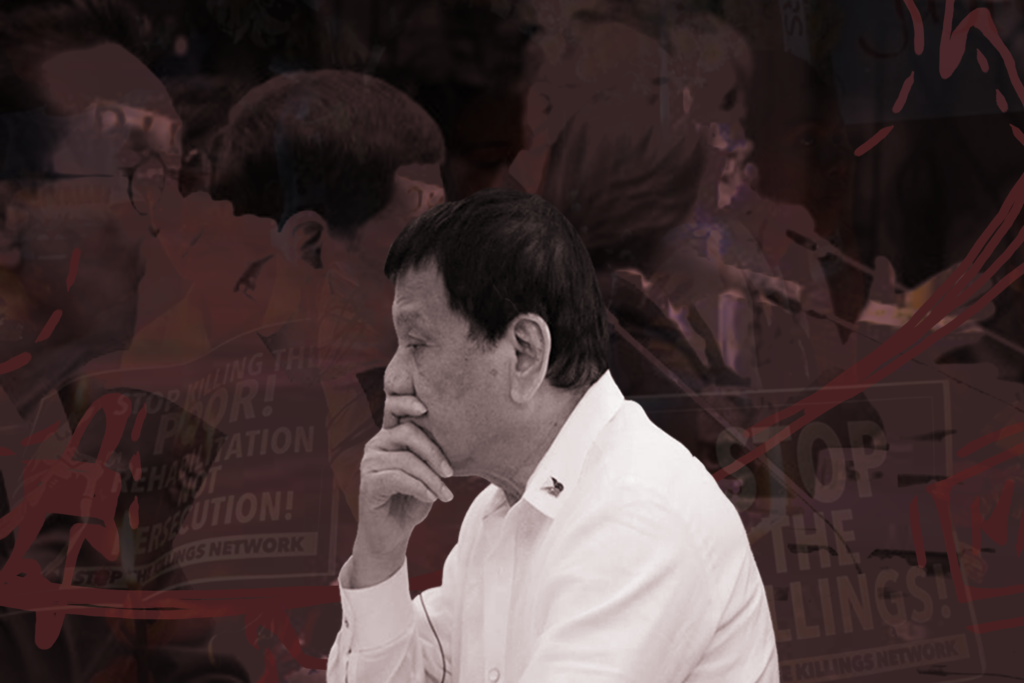Rappler’s report: Duterte’s appearance reveals Senate’s lack of will to hold former president accountable

CHEERS TO Rappler’s two articles on the appearance and testimony of former president Rodrigo Duterte in the October 28 Senate hearing on the war on drugs, the central policy of his administration. Rappler’s stories did more than just record the proceedings and what Duterte had to say. The first presented what the hearing gained, and the follow-up article described the flaws in the conduct of the hearing.
It was the first time Duterte had spoken publicly about his role in the campaign which killed thousands of drug suspects. But most of the media resorted to conventional news reporting, recording what transpired during the event or merely citing what Duterte said.
What was gained
Lian Buan’s account on October 29 pointed to what the probe gained: Duterte’s admission under oath that he organized a death squad, and that he ordered police to “encourage” drug suspects to fight back so that the police could use self-defense to escape charges. She cited the reactions of human rights groups who said the Senate only gave Duterte a platform to ramble on, and that the investigation of the International Criminal Court now has greater merit because of Duterte’s statements.
But Duterte also gained from his appearance as Buan called attention to the leniency of the Senate’s treatment of the former president, allowing him to speak “as often and as long as he wanted, often interrupting (Senator Risa) Hontiveros’ interpellation.” When Hontiveros called out this behavior to Senator Aquilino “Koko” Pimentel III, the chair of the Senate Blue Ribbon subcommittee, Pimentel merely referred to it as typical of Duterte’s “dominating and monopolizing the time.”
CMFR sees Pimentel’s words as an effort to “sane wash” Duterte’s conduct — a term used to describe how some of the media treated the offensive speech of Donald Trump when he campaigned for the US presidency this year.
Buan also observed how the session provided a venue that favored Duterte with a chance to display the continuing loyalty of his core supporters: Senator Ronald “Bato” dela Rosa’s defense of Duterte’s claims, saying on Senate record that Duterte was just joking about the death squad and encouraging suspects to fight back; as well as the presence of Duterte supporters in the gallery who congratulated the former president after the session.
What was lost
The Senate lost its credibility as a separate and co-equal branch of government that provides check and balance to the executive, even in dealing with a former president.
In his article on November 4, Bonz Magsambol showed up the Senate’s impotence in dealing with chief executive’s abuse of power. Following up on Buan’s report, Magsambol pointed to the flawed conduct of the hearings.
The tolerance of the Senate was on overdrive. The report point out how any other witness would have been cited surely for contempt, perhaps, even detained, if he or she had spoken as Duterte did. Magsambol noted that not only did Pimentel allow Duterte to talk at length, but to curse without any senator complaining. Magsambol said Duterte cursed 20 times.
Magsambol picked up Pimentel’s defense aired in an ANC interview: That he, Pimentel, was only chairing a subcommittee, which under Senate rules can perform any and all acts a regular committee is authorized to do, except punish resource persons for contempt. But he countered this excuse saying Pimentel still had the authority to maintain order and to ensure respect for the Senate, which senators are quick to do when dealing with ordinary citizens.
Magsambol also cited other reactions which pointed to the failure of Pimentel to conduct an interrogation of Duterte; allowing him instead to “hijack” the hearing for his purposes.
Senate’s failure to take a stand
Clearly, the Senate missed the opportunity to confront the executive with a consequential investigation which should have been the purpose of the exercise.
Both Buan and Magsambol observed with emphasis how Duterte revealed his lack of remorse about his role in the bloody crackdown on drugs. The two highlighted how the Senate seemed disinclined to hold him to account. The senators’ reticence and timidity aligned them with a chief executive who neither showed remorse nor expressed any regret about his role in the death of thousands of Filipinos, most of whom were living poor and desperate lives.
Leave a Reply